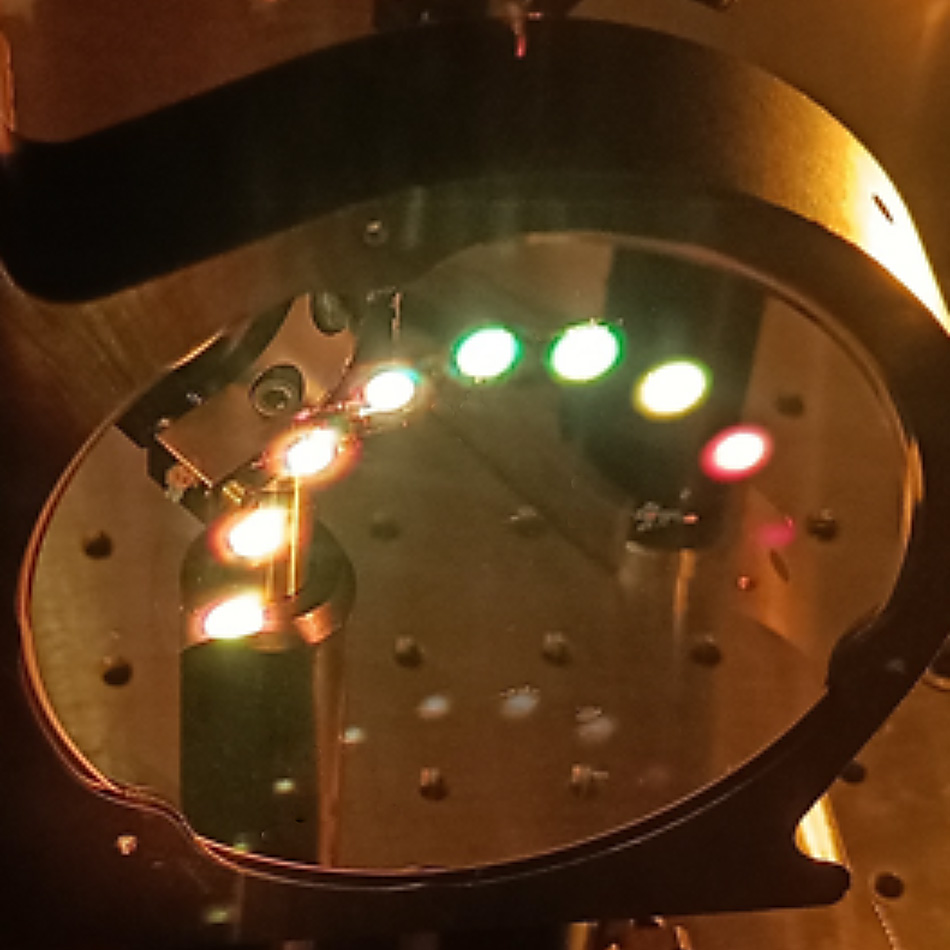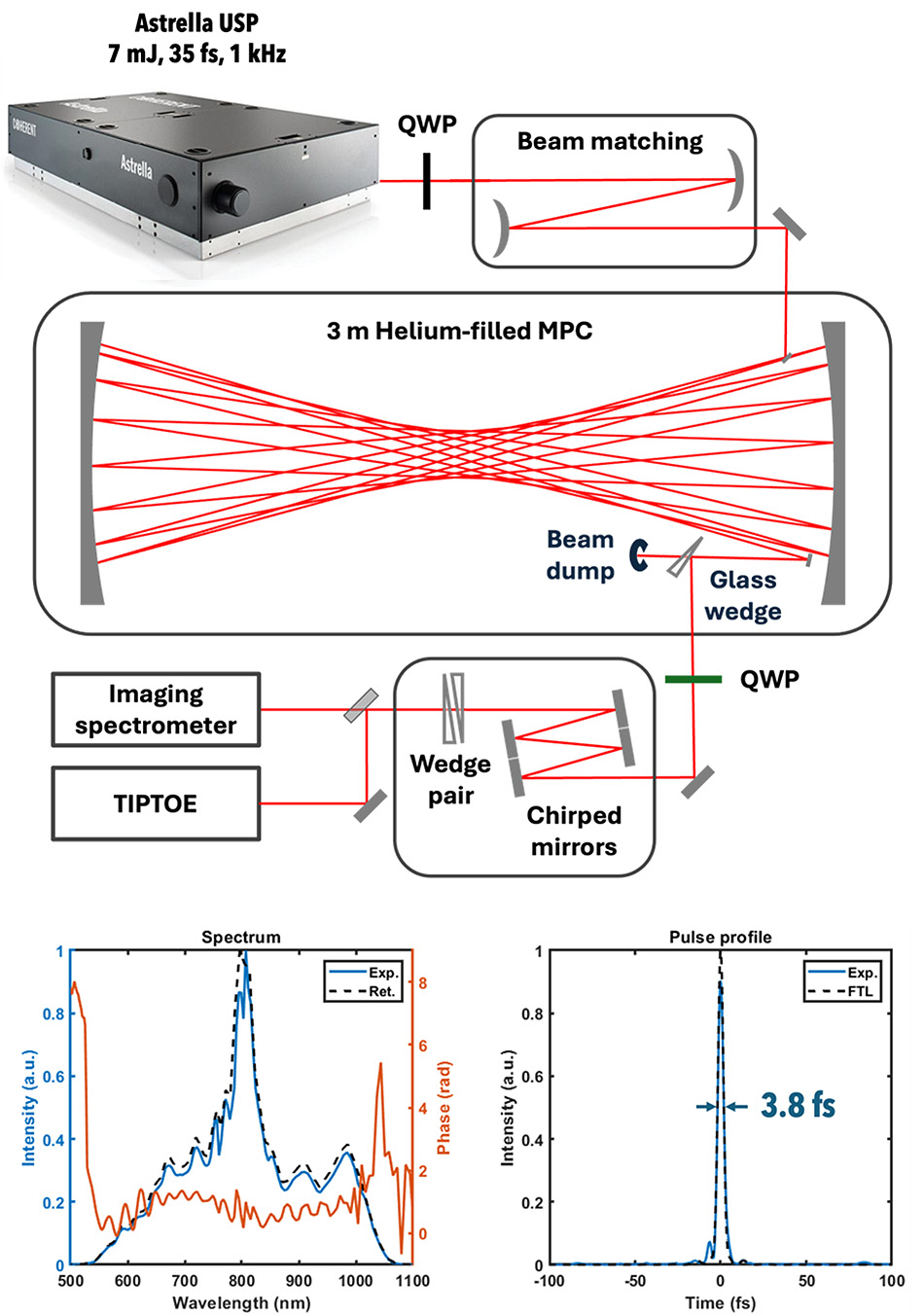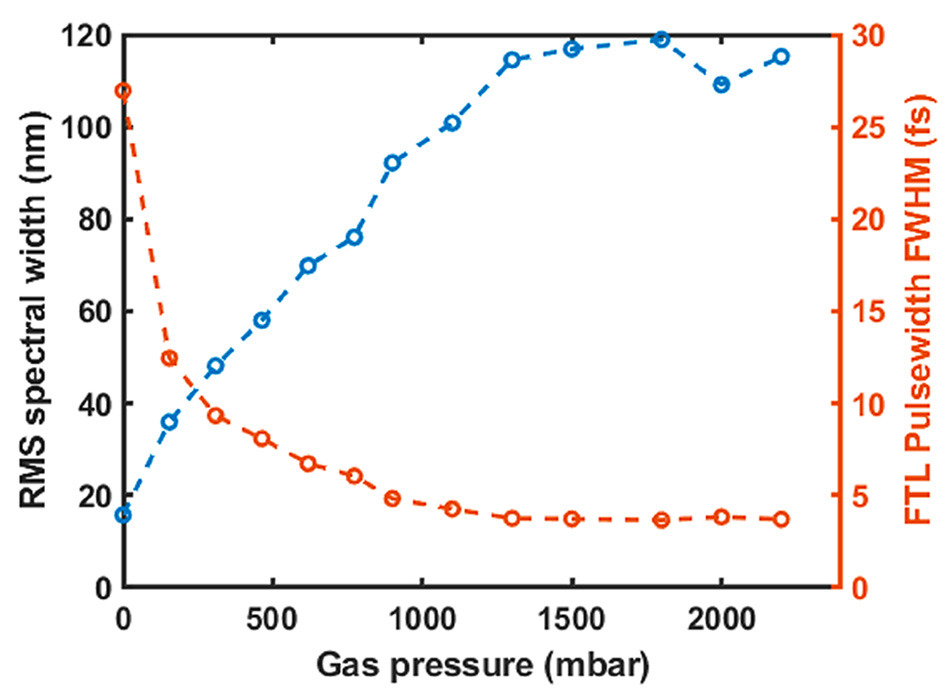WHITE PAPER
Frontier in Intense Short Laser Pulses: Approaching the single cycle with multi-pass cell pulse compression
Overview
In the rapidly evolving field of high-energy laser systems, the pursuit of ultrashort pulse durations combined with high peak powers remains a critical challenge and a catalyst for applications. This article shows how a team of researchers in France from Laboratoire d’Optique Appliquée (LOA) and SourceLAB, have exploited the turnkey simplicity and stable beam quality from an Astrella amplifier to post-compress 7 mJ sub-40 fs pulses down to an astonishing 3.8 fs — corresponding to less than 1.5 optical cycle at an 800 nm central wavelength. This milestone was realized using nonlinear propagation in a gas-filled multi-pass cell (MPC) and intuitive TIPTOE metrology to optimize the temporal profile of the post-compressed laser pulses. With output energies above 4 mJ and an overall compression efficiency of 60%, this simple and compact system provides direct access to the single cycle regime at TW peak power.

Multi-Pass Cell (MPC)
Multi-pass cells (MPCs) are emerging as game-changing technology for post-compressing ultrashort laser pulses and boosting their peak power for applications. MPCs are valued for their high compression ratios, energy throughput, compact footprint, reduced complexity, and excellent spatio-temporal pulse characteristics. Today, MPCs are widely used to reduce the duration of long-pulse Ytterbium (Yb)-based laser systems to a few tens of femtoseconds (fs). In contrast, MPC compression experiments involving short-pulse Titanium:sapphire (Ti:Sapphire) lasers are few and far between, despite being ideal candidates for further compression down the single-cycle regime. The too low pulse energies used in these experiments meant that the post-compressed duration was limited by dispersion and pulse breakup to 2-3 optical cycles. The team of researchers managed to overcome these limitations by exploiting the high-energy pulses from the Astrella USP to achieve sub-1.5 cycle duration, while maintaining excellent pulse quality and competitive efficiency.
Experimental Setup
The experimental setup, depicted in Figure 1, included the Astrella USP laser system, the MPC designed by LOA and housed in a vacuum chamber, beam shaping optics, a chirped mirror compressor, and a TIPTOE metrology device from SourceLAB to simultaneously optimize and measure the post-compressed pulses.

Figure 1. Top: MPC post-compression setup for the Astrella USP Ti:Sapphire laser. QWP = quarter-wave plate. Bottom: spectral and temporal properties of the post-compressed sub-1.5 cycle pulses, as measured by TIPTOE (bottom).
The MPC configuration was optimized using a home-made numerical MPC designer tool to simulate nonlinear pulse propagation in both space and time. The goal was to maximize spectral broadening via self-phase modulation (SPM) while avoiding pulse distortion and optical damage to the broadband MPC end-mirrors.
- Configuration: The MPC was designed with a footprint of approximately 3 meters in length, featuring a stable eigenmode with a 4.3 mm beam diameter on the 1.5 m radius of curvature (ROC) end-mirrors.
- Beam Matching: A pair of adjustable spherical mirrors are used to match the laser mode to that of the MPC while also adjusting for the slight self-focusing experienced by the high-power beam prior to injection into the MPC.
- Gas Medium: Helium was selected as the nonlinear medium due to its high ionization potential and low dispersion, to achieve high spectral broadening at high intensities with minimal ionization effects.
- Polarization: Circular polarization was employed to further mitigate ionization effects during the spectral broadening process as well as any nonlinearities experienced in air prior to injection.
- Mirror Coatings: Enhanced silver mirror coatings were used to accommodate the near-octave-spanning bandwidth of the spectrally broadened pulses.
"Our comprehensive numerical MPC designer tool helped us find the right experimental parameters needed to achieve the highest possible spectral broadening while maintaining good pulse compressibility and staying below the damage threshold of the MPC optics. "- Dr. Louis Daniault, principal investigator of the study.
Results and Discussion
Spectral Broadening and Compression Factor: By adjusting the gas pressure and the number of passes inside the MPC, the team found the right balance between spectral broadening, dispersion and spatiotemporal pulse distortion. The MPC was configured for 28 passes, which provided the best output pulse quality while minimizing losses.

Figure 2: Evolution of the measured RMS spectral bandwidth (blue) and Fourier-transform-limited (FTL) pulse duration (red) versus Helium gas pressure inside the MPC.
As shown in Figure 2, the output spectrum broadens almost linearly with increasing gas pressure before saturating because of dispersion and reaching an optimum around 1800 mbar. Beyond this point, said Dr. Daniault, any further increase in pressure leads to pulse distortion and poor temporal compressibility. This highlights the importance of finely optimizing the MPC design to achieve the highest compression factor without compromising pulse quality.
Temporal Compression and Characterization: For an effective input pulse energy of 6.7 mJ (accounting for transmission losses before injection), the output energy measured straight out of the MPC was 4.6 mJ, yielding a throughput efficiency of approximately 69%, consistent with the end-mirror reflectivity and the number of passes. To avoid propagating the high peak power pulses in air after the MPC, a fraction of the pulses was sampled via reflection off a thin glass wedge and sent outside the vacuum chamber to be temporally compressed and characterized.
Compressing the sampled pulses to their shortest duration was achieved using a set of eight pairs of double-angle broadband chirped mirrors, providing a total group delay dispersion of-640 fs², and a wedge pair for fine tuning residual dispersion. Precise temporal characterization was performed using a TIPTOE (Tunneling Ionization with a Perturbation for the Time-Domain Observation of an Electric field) device developed by SourceLAB, which is an advanced diagnostic tool enabling direct measurement of the electric field of ultrashort laser pulses with high temporal resolution, crucial for verifying the compressed pulse duration and quality.
Compressed Pulse Quality: TIPTOE measurements revealed a pulse duration of 3.8 fs, very close to the Fourier-transform limit of 3.6 fs, and the temporal Strehl ratio was measured to be approximately 80%, indicating that the excellent pulse compressibility out of the MPC. Despite being compressed at low energy, the compressed pulses maintained an excellent spatial profile with near-Gaussian distribution and excellent spatio-spectral beam homogeneity (as measured with an imaging spectrometer), indicating good potential for achieving high focused intensities.
Peak Power Enhancement: The additional energy losses experienced by the sampled pulses lead to an overall compression efficiency of 60%. Successful compression at full energy, which would have to be implemented under vacuum to preserve beam quality, would therefore lead to a significant boost in laser peak power:
- Astrella USP peak power: approximately 0.2 TW before compression.
- Compressed Peak Power: close to 1 TW, representing a fivefold increase.
Commercialization Prospects
The significance of this achievement extends beyond the laboratory, offering tangible benefits for industry and research facilities employing high-energy laser systems. The successful demonstration of efficient MPC compression of high-energy Ti:Sapphire laser pulses opens the door for commercialization, especially for users of Astrella laser systems worldwide.
"Based on this groundbreaking advancement, our company has decided to commercialize the MPC architecture developed at the LOA. We are committed to providing Astrella users globally with access to this cutting-edge technology, enabling them to achieve ultrashort pulse durations with high peak powers."- Dr. François Sylla, CEO of SourceLAB.
Conclusion
The study successfully demonstrated the scaling of MPC post-compression of Ti:Sapphire laser pulses with energies up to 7 mJ, achieving a record breaking 3.8 fs final pulse duration (sub-1.5 optical cycle) at 1 kHz repetition rate. Key achievements include:
- High Compression Efficiency: An overall compression efficiency of 60%, with a potential fivefold increase in laser peak power.
- Excellent Beam Quality: Preservation of both spatial and temporal beam quality, crucial for applications requiring high focused intensities.
- Scalability: Demonstration of MPC scalability to higher energies and shorter pulse durations with high spatiotemporal pulse fidelity. "MPC compression of commercial high-average-power lasers will quickly lead to real-life applications of high-flux secondary particle and radiation beams produced from intense laser-plasma interactions.”, Dr. Rodrigo Lopez-Martens, LOA team leader.
Implications for Future Research: The ability to efficiently and reliably generate high-energy few-cycle pulses has significant implications:
- Strong-Field Physics: Enables the study of novel nonlinear phenomena with high-energy isolated attosecond pulses.
- Laser-Plasma Interactions: Facilitates laser-driven particle acceleration at high repetition rate, potentially impacting medical therapies and materials science.
- Spectroscopy and Imaging: Improves temporal resolution in ultrafast spectroscopy and imaging techniques, allowing observation of rapid processes in chemistry and biology.
Technical Innovations: The success of this work rests on two key innovations:
- Optimized MPC Design: The use of advanced numerical MPC design tools to optimize spectral broadening and pulse compressibility with minimal losses.
- Advanced Pulse Characterization: Employing the TIPTOE device by SourceLAB for accurate temporal pulse characterization.
Acknowledgments
The researchers acknowledge the support of Coherent Inc. that enabled this breakthrough. The synergy between numerical simulation power, experimental expertise, and advanced diagnostic tools was instrumental in achieving these results.
References
- MPC post-compression of Astrella USP: Sub-2-cycle post-compression of multi-mJ energy Ti:sapphire laser pulses in a gas-filled multi-pass cell, Louis Daniault, Jaismeen Kaur, Geoffrey Gallé, Cédric Sire, François Sylla, and Rodrigo Lopez-Martens, Optics Letters 49(23), 6833-6836 (2024
- TIPTOE metrology: Direct sampling of a light wave in air, Seung Beom Park, Kyungseung Kim, Wosik Cho, Sung In Hwang, Igor Ivanov, Chang Hee Nam, and Kyung Taec Kim, Optica 5(4), pp. 402-408 (2018)
Authors: Louis Daniault, Jaismeen Kaur, Geoffrey Galle, Cedric Sire, François Sylla, and Rodrigo Lopez Martens